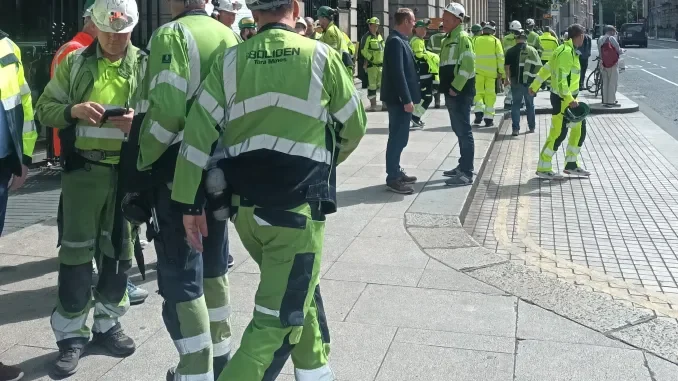
Workers in Tara Mines in Navan, Ireland, have voted to accept the proposals from the management of the mine. This was recommended by the three unions representing the workers; SIPTU, Unite, and Connect, following negotiations at the Workplace Relations Committee. The vote was passed by a 60/40 majority. It was announced in June that the mine, which is owned by Swedish company Boliden, would be entering into care and maintenance, resulting in the loss of 650 plus jobs.
The deal consists of a retainer allowance of €65 per week for laid-off workers, a small increase in care and maintenance staff, an early retirement package, and the same terms and conditions upon a return to work.
Workers engaged in a blockade outside Tara Mines following the announcement of the closure and it certainly cannot be said that the workers didn’t stand up for themselves and fight back. Any improvements that this deal has provided are a direct result of workers taking action.
Unfortunately, €65 per week on top of €220 Jobseekers Payment is not nearly enough to pay the bills or keep a roof over these workers’ heads. The government all but admitted that it was impossible to live on the Jobseekers Payment during the pandemic when they were forced to set the Pandemic Unemployment Payment at €350 per week. They knew that people cannot live off these tiny payments. Employer’s PRSI is deliberately kept low. It is the second lowest in the European Union and is far lower than comparable countries in Europe. The consequences of this are workers who are made redundant are forced immediately onto the pitifully low Jobseekers’ payment. Benefits on redundancy should be indexed to salary at redundancy. The trade union movement must fight for this in the aftermath of the Tara Mines closure.
We also know that this company is a profitable one. It is the largest zinc mine in Europe and the eighth largest in the world. It has operated almost uninterrupted for 44 years. The company has made €5 billion in profit since 2010 and last year the CEO was paid €1.4 million. Workers should demand the opening of the company’s financial books to trade union inspection to see exactly what is and has been happening to the profits and demand that workers’ wages are prioritised in case of closure.
It is welcome that the workers will maintain the same level of terms and conditions upon return to work. The company does not have a good track record in this regard, as in 2009 they used the threat of job losses to force the workers to agree to significant pay cuts and changes to working conditions.
These mines are critical economic infrastructure. What is happening in Tara mines illustrates the need for public ownership of key resources, like Tara, under democratic workers’ control and management. The mines are a resource that should belong to us, but they were sold off to a private company for the profit of individuals who can then decide to lay off their workforce if they wish. These resources should belong to us, the working class!
Workers have been completely failed by our neoliberal government which refuses to so much as consider the idea of nationalisation to preserve the mine. Capitalism continuously prioritises profits for big business over the interests of the working class. For this reason, the closure of Tara Mines is an inherently political issue as well as an industrial one.
Job losses, closures, and cuts to terms and conditions are only going to get worse. It is essential that we have trade unions that will fight for and defend workers’ rights and that we build a mass party of the working class that can fight for real change and a socialist society that benefits us, not the bosses and the billionaires.
Special financial appeal to all readers of socialistworld.net |
Support building alternative socialist media Socialistworld.net provides a unique analysis and perspective of world events. Socialistworld.net also plays a crucial role in building the struggle for socialism across all continents. Capitalism has failed! Assist us to build the fight-back and prepare for the stormy period of class struggles ahead. Please make a donation to help us reach more readers and to widen our socialist campaigning work across the world. |
Donate via Paypal |
| M | T | W | T | F | S | S |
|---|---|---|---|---|---|---|
| 1 | 2 | |||||
| 3 | 4 | 5 | 6 | 7 | 8 | 9 |
| 10 | 11 | 12 | 13 | 14 | 15 | 16 |
| 17 | 18 | 19 | 20 | 21 | 22 | 23 |
| 24 | 25 | 26 | 27 | 28 | 29 | 30 |
| 31 | ||||||

